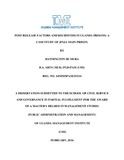POST-RELEASE FACTORS AND RECIDIVISM IN UGANDA PRISONS: A CASE STUDY OF JINJA MAIN PRISON.
Abstract
This study investigated post-release factors that contribute to recidivism in Jinja Main Prison. The
objectives of the study were: To assess how the availability of employment opportunities
contribute to recidivism in Jinja Main Prison, to find out how peer groups contribute to recidivism
in Jinja Main Prison, and to establish how personal motivation contributes to recidivism in Jinja
Main Prison. The study used a cross sectional survey design and collected data was from 84
respondents. Both qualitative and quantitative techniques were used. The study revealed a negative
relationship between availability of employment opportunities and recidivism with a standardized
coefficient (B) of -0.037, implying contribution in recidivism by 3.7%. Nevertheless, peer groups
were found to contribute to recidivism as there is no follow-up upon one’s release from prison. It
was found to have an Adjusted R square of -0.005, implying that it contributes to recidivism by
0.5%. It was established that lack of availability of employment opportunities contributes to
recidivism. It was also found out that peer groups have a contribution on recidivism in JMP. It is
recommended that the employers and the general public be sensitized on the role of the prisons
service in Uganda in order to change a negative perception towards ex-inmates. It is also
recommended that as an inmate’s time to be released is approaching, measures be put in place to
ensure a closer monitoring of that person’s interaction to limit getting in contact with the bad
elements that are responsible for influencing their behaviors.

